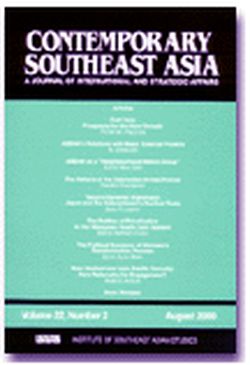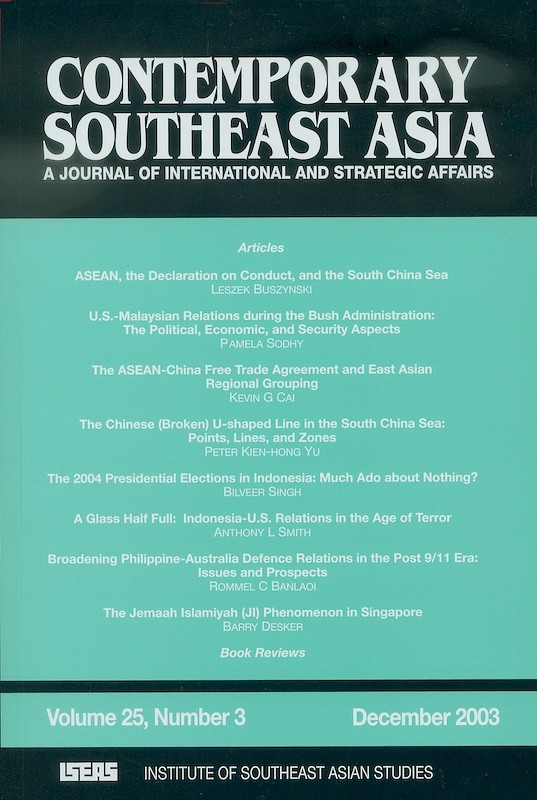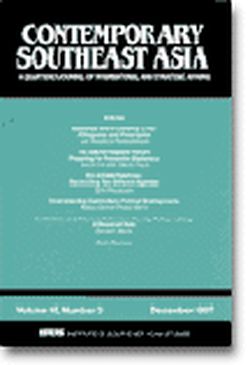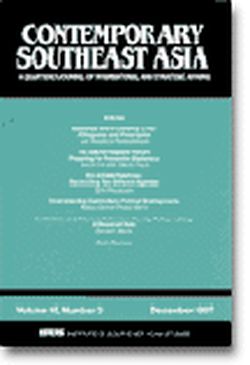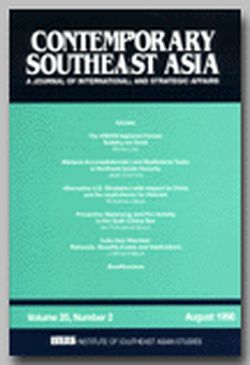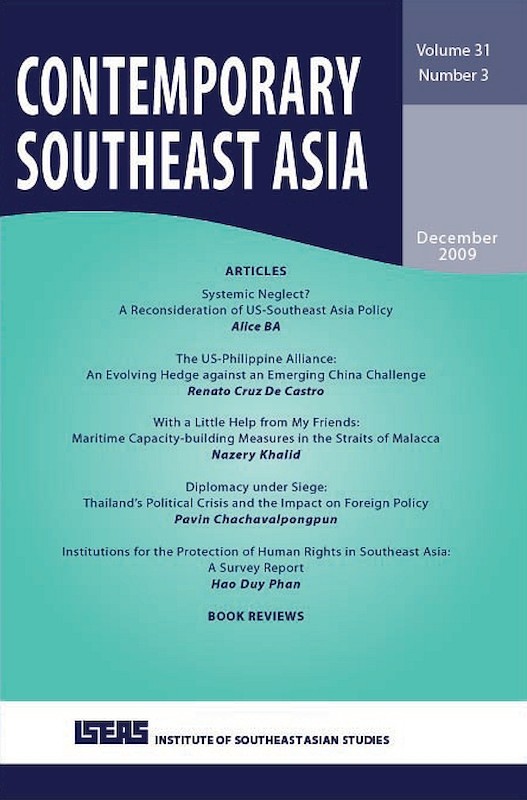Contemporary Southeast Asia: A Journal of International and Strategic Affairs Vol. 22/3 (Dec 2000)
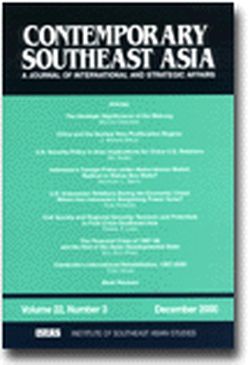
Date of publication:
February 2001
Number of pages:
207
Code:
CS22/3
About the publication
An internationally refereed journal that specializes in the politics, international relations and security-related issues of Southeast Asia and the Asia-Pacific.
Contents
-
Preliminary pages
- ARTICLES
-
The Strategic Significance of the Mekong, by Milton Osborne, author see abstractDespite its size, the Mekong River has not played a unifying role as have other great rivers such as the Nile in Egypt or the Yangtze in China. Flowing by or through six countries (China, Myanmar, Laos, Thailand, Cambodia and Vietnam), the Mekong is nevertheless vital to Southeast Asias ecology. However, efforts to make it a route for commercial navigation have been largely unsuccessful. Perhaps best known for the wars fought in its delta in the post-World War II period, the Mekong is now a focus for concern on the part of downstream countries as China embarks on a major dam-building programme in Yunnan Province. Will these dams have damaging effects on the rivers vital role as a source of fish and carrier of silt that aids horticulture and agriculture?
-
China and the Nuclear Non-Proliferation Regime, by J Mohan Malik, author see abstractThis article surveys China's policy towards the nuclear non-proliferation regime and contests the view that China has now completed the transition from a challenger to an upholder of the global non-proliferation regime. It argues that the learning curve hypothesis and the bureaucratic politics and profit motives arguments provide only a partial explanation of China's shifting but ambiguous and contradictory policy towards non-proliferation. China has cleverly played the proliferation card by exploiting loopholes in the non-proliferation regime and contradictions in major power relationships so as to serve its national security interests. The article examines the factors that have led Beijing to disregard the non-proliferation regime in the past and might make it continue to do so in the future. It also analyses the changing Asian security environment and its impact on China's non-proliferation commitments in the future.
-
U.S. Security Policy in Asia: Implications for China-U.S. Relations, by Wu Xinbo, author see abstractAs the two major players in the Asia-Pacific region, China and the United States are increasingly in disagreement over security concepts and practices. In an era when Washington is trying to build a Pax-Americana, Beijing feels strongly that its security interests in Asia are being challenged. The prospect of security relations between China and the United States will shape the political-security dynamics of the Asia-Pacific in the twenty-first century. While both sides will continue to pursue their security interests in Asia as they see appropriate, each has to adapt itself to the changing political, economic, and security landscape in the region and learn how to live with the other. This approach requires both countries to adjust their respective security policies as the regions geopolitical dynamics evolve.
-
Indonesia's Foreign Policy under Abdurrahman Wahid: Radical or Status Quo State?, by Anthony L Smith, author see abstractWhen Abdurrahman Wahid first came to power in Indonesia there was some alarm over the direction of Indonesia's foreign policy. However, the reality is that Abdurrahman's foreign policy has been more orthodox than some of his earlier rhetoric might have indicated. Indonesia needs the developed world as a source of funding to revive its economy. In terms of foreign diplomacy, Indonesia has successfully gained reassurances from the international community of its territorial integrity. ASEAN also remains central to Jakarta's foreign policy outlook. The issue of East Timor is still a crucial sticking point between Indonesia and a number of Western countries. The United States, in particular, is reluctant to push Indonesia too far as it is believed that the Abdurrahman presidency is the least desirable alternative in domestic and foreign policy terms.
-
U.S.-Indonesian Relations During the Economic Crisis: Where Has Indonesia's Bargaining Power Gone?, by Timo Kivimaki, author see abstractThe U.S.-Indonesian diplomatic bargaining setting has changed dramatically since the end of the Cold War. The changes in the structure of global power explain why, during the Asian economic crisis, the United States was able to wield considerable influence in support of its political objectives vis-ÃÂÃÂ -vis Indonesia. It will be argued in this article that the hegemonic structure of Cold War international relations protected Indonesia's authoritarian lite from the global pressure towards democracy, and that the end of the Cold War explains why Indonesia became very exposed to this pressure during the regional economic crisis. While recognizing some of the positive aspects in the loss of bargaining power of Indonesia's authoritarian lite, the article also sees problems related to it and offers suggestions on how democratic Indonesia might avoid external pressures.
-
Civil Society and Regional Security: Tensions and Potentials in Post-Crisis Southeast Asia, by Pierre P Lizee, author see abstractThis article delineates the areas where there might be some consonance between the dynamics underlying the present interest in Southeast Asia in the notion of civil society and those linked to the current reassessment of the discourse and practice of security in the region. The areas where tensions can be expected between these two sets of dynamics are also considered. An attempt is then made to establish the policy parameters which, under such circumstances, should guide the regional debate on these issues. The central argument advanced in this context is that it is now possible to create in Southeast Asia mechanisms allowing for a degree of synergy between the development of civil society and that of regional security which will be beneficial to both of these processes.
-
The Financial Crisis of 1997-98 and the End of the Asian Developmental State, by Eul-Soo Pang, author see abstractFinancial globalization in the 1990s effectively dismantled the Asian developmental state and forced East Asia to search for a new political economy model. The paradigm shift in world economic development from state-driven planning to market-driven management has taken place since the late 1980s in Northeast Asia, spreading to Southeast Asia in the 1990s. The access to global capital markets by Asian corporations, both parastatal and private, has effectively reduced their dependency on the state for financial resources. In fact, the Asian developmental state and financial globalization are incompatible and often in conflict. By externalizing financial forbearance, Asian corporations and the global market have forced the state to change. Thus, important political changes have taken place in Northeast Asia and are now also occurring in Southeast Asia.
-
Cambodia's International Rehabilitation, 1997-2000, by Tony Kevin, author see abstractThis article offers a historical analysis of Cambodia's recent three-year crisis of international legitimacy, provoked by the brief civil war in July 1997, and finally settled between November 1998 and mid-2000. Overwhelming international condemnation of Hun Sens government after the July 1997 fighting seriously delayed national reconciliation and a return to stable government. However, the origins of Cambodia's complex 1997 crisis go back to UNTAC and before. This article argues that from 1993 onwards and especially during the 199798 crisis, Cambodia's national sovereignty came under serious challenge from increasingly powerful ideas about international peace enforcement and the imposition of international norms of behaviour on small or weak states. Cambodia fought off such pressures: it found a new domestic political equilibrium, and in so doing succeeded in reclaiming its sovereignty and international legitimacy.
- BOOK REVIEWS
-
BOOK REVIEW: The Quest for Identity: International Relations of Southeast Asia. By Amitav Acharya., by Diane K. Mauzy, author
-
BOOK REVIEW: Environment and Development in the Straits of Malacca. By Mark Cleary and Goh Kim Chuan., by Nicholas Tarling, author
-
BOOK REVIEW: China and the South Sea Dialogues. By Lee Lai To., by Jason Abbott, author
-
BOOK REVIEW: Malaysias Political Economy. Politics, Patronage and Profits. By Edmund Terence Gomez and Jomo K. S., by Bruno Trezzini, author
-
BOOK REVIEW: Maintaining the Strategic Edge: The Defence of Australia in 2015. Edited by Desmond Ball., by David Dickens, author
-
BOOK REVIEW: Voices from S-21: Terror and History in Pol Pots Secret Prison. By David Chandler., by Sue Downie, author
-
Index to Volume 22

